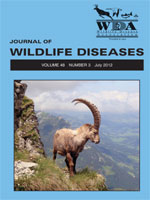Common Quail (Coturnix coturnix) were subjected to controlled and replicated experiments in the summer of 2008 to investigate the effects of short-term dehydration on cholinesterase activity in brain and plasma and the interaction between dehydration and exposure to the organophosphorus pesticide dicrotophos in these same tissues. Our objective was to determine if dehydration could confound the diagnosis of anticholinesterase exposure using inhibition of cholinesterase activity in quail tissues. The effect of dehydration was quantified using measures of plasma osmolality and hematocrit. Dicrotophos exposure caused significant inhibition of cholinesterase activity in brain, while the effects of dehydration and interaction were not significant. Dehydration caused significant duration-dependent increases in plasma osmolality and hematocrit. Dehydration also caused a significant increase in plasma cholinesterase activity. Variation in the change in plasma cholinesterase activity in response to dehydration was significantly and positively correlated with dehydration-induced variation in both the change in plasma osmolality and the change in hematocrit. These correlations suggest that plasma cholinesterase activity in quail is not limited to plasma but occupies some larger pool of the extracellular fluid volume, and we suggest lymph is part of that pool. The effects of dehydration on plasma cholinesterase activity masked the inhibitory effects of dicrotophos. Here, the combination of dehydration and dicrotophos exposure produced plasma cholinesterase activity that was not significantly different from reference and pre-exposure values, confounding the diagnosis of anticholinesterase exposure in dehydrated, dicrotophos-exposed quail. A method to adjust plasma cholinesterase activities for the confounding effects of dehydration and enable the diagnosis of anticholinesterase exposure in dehydrated, dicrotophos-exposed quail was developed. Clinicians and practitioners responsible for the diagnosis of anticholinesterase exposure in birds are cautioned that dehydration, commonly observed in sick wildlife, may mask the effect of anticholinesterases on plasma cholinesterase activity.
How to translate text using browser tools
1 July 2012
COMBINED EFFECT OF SHORT-TERM DEHYDRATION AND SUBLETHAL ACUTE ORAL DICROTOPHOS EXPOSURE CONFOUNDS THE DIAGNOSIS OF ANTICHOLINESTERASE EXPOSURE IN COMMON QUAIL (COTURNIX COTURNIX) USING PLASMA CHOLINESTERASE ACTIVITY
James Heffernan,
Pierre Mineau,
Ramona Falk,
Mark Wickstrom
ACCESS THE FULL ARTICLE

Journal of Wildlife Diseases
Vol. 48 • No. 3
July 2012
Vol. 48 • No. 3
July 2012
Anticholinesterase
Dehydration
diagnosis
exposure
organophosphorus insecticide
rehabilitation




